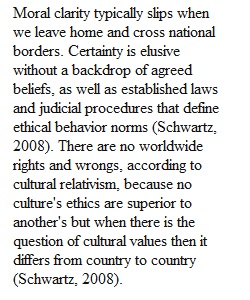


Q The following questions are based on the readings and videos from Module 6 Global and Socially Responsible Leadership. Please choose two or more of these questions and share your answers with the other classmates. 1. When conducting business in another country that has a different set of cultural values from those of your home culture, whose values should prevail? That is, how do you reconcile ethical dilemmas that arise when the ethical values of people from other cultures with whom you are doing business are at odds with those of your company, or you personally? 2. If you have experienced an ethical dilemma based on differing culture values, how did you resolve the dilemma? What did you learn from the experience? 3. Think of an example of corporate social irresponsibility for an organization with which you are highly familiar. Your example could pertain to actions of your current or a former employer, an organization with which you do business (e.g., a supplier or customer), or an organization that is in the news. Using Figure 1 from the Muethel article titled “Leader Reactions to Corporate Social Irresponsibility”, indicate the particular strategy that the leader in your example used to address the corporate failure. NOTE: Be sure to answer two or more questions. Your initial posting in response to these questions should be a minimum of one well-developed paragraph and a maximum of three paragraphs. Your responses to classmates must be substantive and add value to the conversation. See the "Rubric for Asynchronous Discussion Participation" for more information on the discussion board expectations and assessment criteria.
View Related Questions